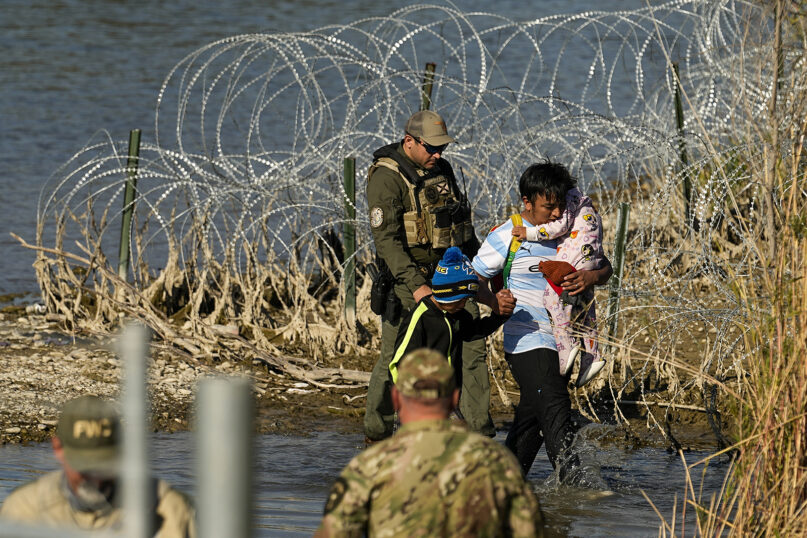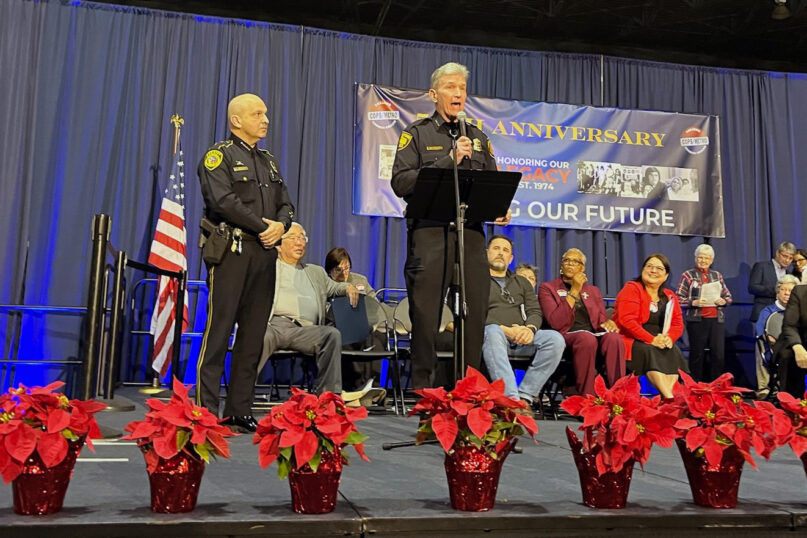SAN ANTONIO (RNS) — The children had already gathered on stage for the praise dance finale of a local community organizing network event when Archbishop Gustavo García-Siller took the microphone and put his arm around Sheila, an immigrant who had told the archbishop she was living in fear of Donald Trump’s second administration.
Speaking Spanish, García-Siller asked the crowd of hundreds of Catholics and other people of faith, “What do you want to offer her?”
“Justice,” someone shouted. “Equality,” someone else responded. “We’re with you, Sheila.”
With President-elect Trump vowing to deport millions of immigrants over the next four years, many communities along the U.S.-Mexico border are preparing to protect residents from what they expect to be draconian measures to identify and remove immigrants of various legal statuses.
Faith leaders in Texas have long experience in advocating for migrants not only from federal policies but, since 2021, Gov. Greg Abbott’s Operation Lone Star, which has deployed the Texas National Guard and allocated billions of dollars for border enforcement. In that time, migrant drownings have spiked at crossings along the Rio Grande, where the government installed razor wire and blockade buoys.
In the weeks before Trump takes office, García-Siller and other Catholic leaders are drawing on that experience, providing strategic support but also spiritual care.

Migrants are taken into custody by officials at the Texas-Mexico border, Jan. 3, 2024, in Eagle Pass, Texas. (AP Photo/Eric Gay)
“We cannot let fear paralyze people because then they can be the worst of themselves,” García-Siller told RNS after the Dec. 8 event, a launch for the 50th anniversary of COPS/Metro Alliance, a grassroots advocacy network. “We get sick, emotionally, spiritually, physically. We start acting in very strange ways, even to damage ourselves.”
García-Siller said he reminds migrants in these times why they came to the U.S. “They had hope. This is not a time to give it away or to let somebody take it away. No matter how loud the voices are, you are you, and God is with you. God loves you. We love you.”
The archbishop, himself an immigrant from San Luis Potosí, Mexico, and now the only immigrant leading a Catholic diocese on the border, said he is not taking the incoming administration or the state government’s crackdown lightly. “Already there are new measures here in the state by the river to destroy human beings like meat, as you ground meat,” he said.
García-Siller said the state’s measures disregard “the dignity of the human person,” and he compared them to Nazi Germany.
In San Antonio, faith communities have been distributing congregational IDs, a form of identification pioneered during the first Trump administration by the Dallas affiliate of the interfaith Industrial Areas Foundation. The cards are designed to ease migrants’ fears when interacting with local police and to encourage them to keep interacting with their communities.
At the COPS/Metro event, two pastors of local Catholic churches, the Revs. Jimmy Drennan and Marlee Abao, who are also leaders of the San Antonio Industrial Areas Foundation affiliate, asked San Antonio Police Chief William McManus and Bexar County Sheriff Javier Salazar to help train officers on recognizing the congregational IDs to “build trust between the community and the police,” the two pastors said. The law enforcement leaders responded affirmatively.

San Antonio Police Chief William McManus, center, addresses a COPS/Metro Alliance 50th anniversary event in San Antonio, Dec. 8, 2024. (RNS photo/Aleja Hertzler-McCain)
The congregational IDs have also been used in another border diocese of Brownsville, Texas, where Bishop Daniel Flores and other local faith leaders introduced them in 2019. Even parishioners with other forms of ID have chosen to get the congregational IDs to show solidarity with migrants. “It’s for everyone, so that there is no discrimination,” said Delfina Villarreal, a leader with Valley Interfaith and parishioner at St. Juan Diego Catholic Church in McAllen, in Spanish, “so that’s why we’re asking people, that everyone who wants to get a parish ID, to come and register at the parish.”
Sister Norma Pimentel, who heads Catholic Charities of the Rio Grande Valley, the Brownsville Diocese’s humanitarian arm, told RNS she has developed plans for two different migrant populations: those still struggling to reach the U.S. and those in the U.S. who are worried about deportation.
Migrants stuck on the streets on the Mexico side of the border or deported there are “in great danger,” Pimentel said, and are often without resources. She recently met with faith leaders in Matamoros, on the Mexico side, to make plans to provide these people water, food, blankets and tents.
For the immigrants in the U.S., Pimentel plans to gather resources at the Humanitarian Respite Center, a former nightclub where she now welcomes 100 to 170 migrants a day. The nightclub’s former bar is now stocked with infant formula, Advil and hygiene products, she said, and will likely be converted into a space where migrants can get legal counseling.

Sister Norma Pimentel, left, speaks with a child at the Catholic Charities of the Rio Grande Valley Humanitarian Respite Center in McAllen, Texas, Dec. 12, 2024. (RNS photo/Aleja Hertzler-McCain)
It’s not only undocumented immigrants who fear the new federal policies. In San Antonio, García-Siller said that even naturalized citizens like him and legal residents who are not citizens are concerned that the Trump administration’s plans will cause them legal trouble. Some pastors of his churches who are immigrants themselves, the archbishop said, are afraid for the status of their “legal permits” or visas.
“Fear in leadership leads to crazy things and inhuman actions, leads to disaster,” the archbishop said, explaining that he hoped to address the topic at a February meeting with priests.
García-Siller said he is working to arrange a “synodal” meeting of San Antonio’s civic leadership — one that stresses dialogue — to make plans for the next four years. But a synodal approach on immigration is “impossible” at the state level, he said, even as Texas’ Catholic bishops meet regularly with the governor and legislative leaders.
“There have been good things, but also bad things,” García-Siller said of those meetings, but on immigration, the politicians “cannot see it,” making it hard for him to understand how leaders can “be an instrument of harm to others, others that you don’t even know.”
In July, a county judge blocked Attorney General Ken Paxton from deposing Pimentel as part of an investigation he has pursued into faith-based nonprofits working with migrants. The archbishop said San Antonio’s Catholic Charities organization had faced similar state scrutiny.
García-Siller said “thanks be to God” his diocese had very carefully documented its efforts to dispute the accusations of human trafficking that some Republicans have leveled at Catholic Charities, adding that the archdiocese’s response would be not “to play their games,” but instead to supply such high-quality programming that the government cannot deny its necessity.
“Every human person is so beautiful, and in this I include my friends, my family, my collaborators, those that we are co-responsible in the mission of Jesus in the church,” García-Siller said. “I speak about my enemies, and I have pictures of them in my bedroom, in my office because I believe that they were created by God and they are beautiful.”
God “is with us, is with everyone,” he added. “God is with the new (presidential) administration. I hope that they will see his presence down … inside.”
Pimentel emphasized the “responsibility” that everyone shares to speak out against evil policies, especially the Trump administration’s plan to retract a policy that prevented Immigration and Customs Enforcement from arresting migrants at schools, hospitals and churches.
“People will enter into fear to go to Mass, to celebrate their faith, to go to the hospital if they are sick, to take (their kids) to school,” Pimentel said. “That’s a terrible crisis.”
The sister said: “The community has to speak. It’s us who have to be the voice to say that this isn’t OK.”
She continued: “If you see something bad, you have to denounce it. You have to name it, the evil, because speaking the truth is what we are called to do. And if that brings consequences, well, we’ll accept them because we should not be silent.”